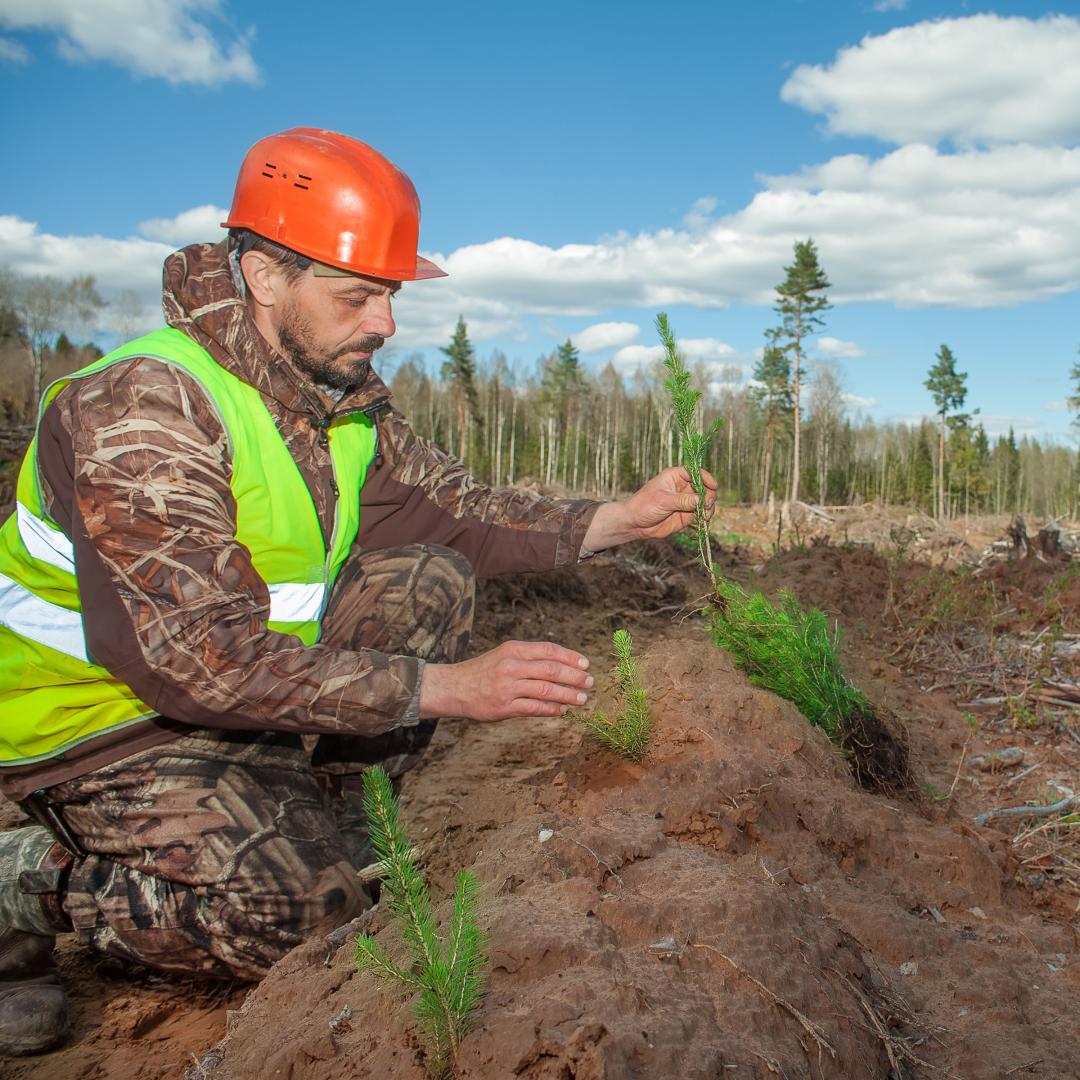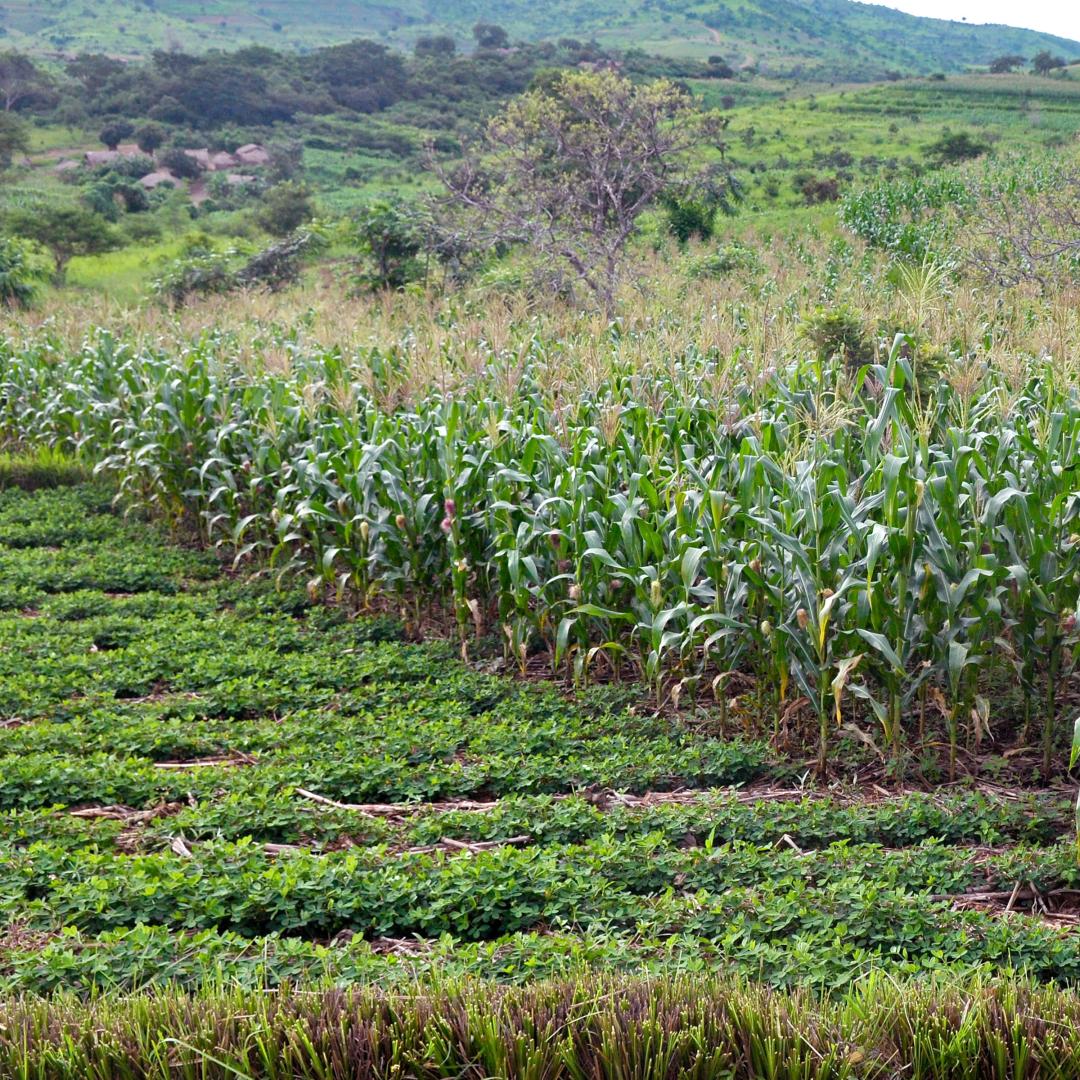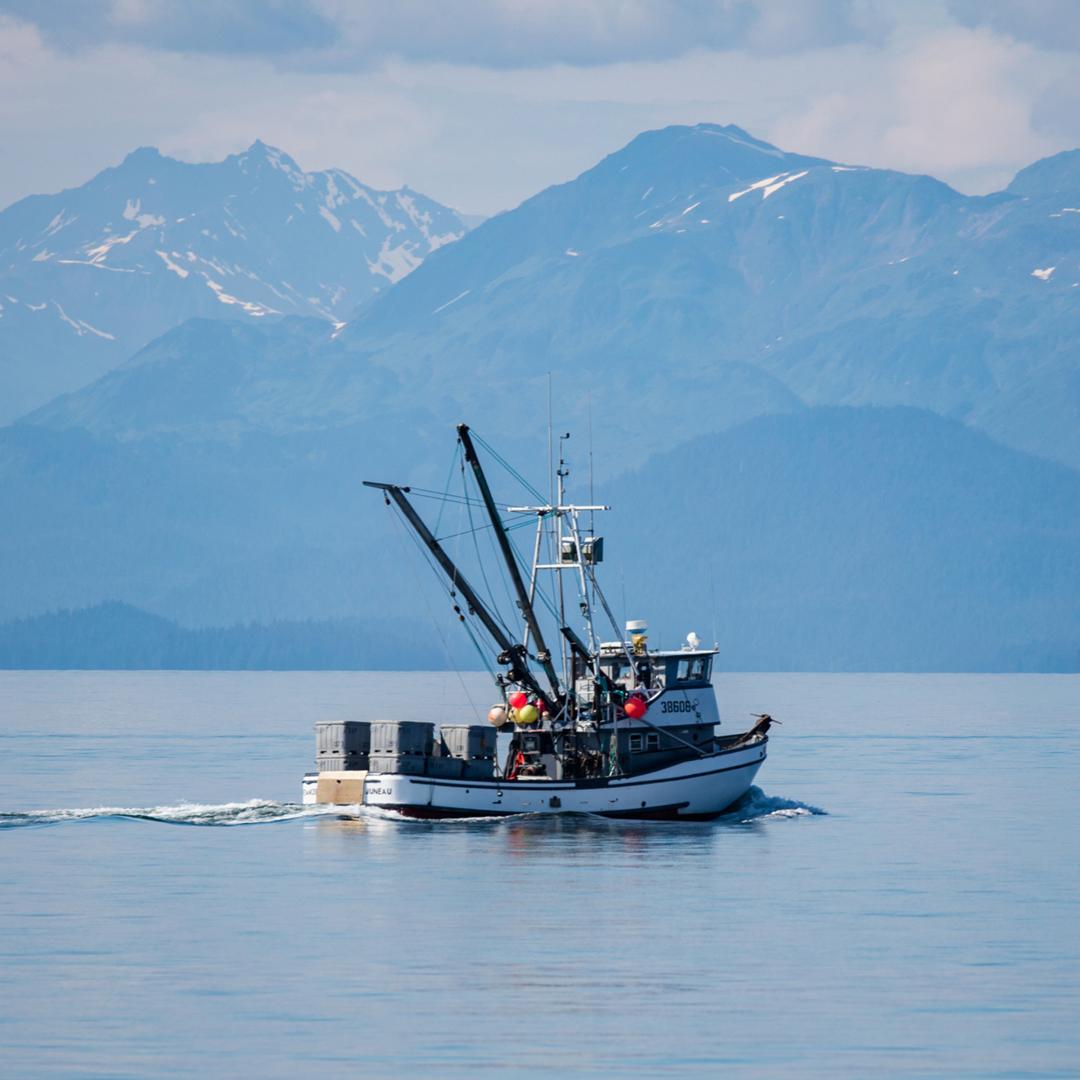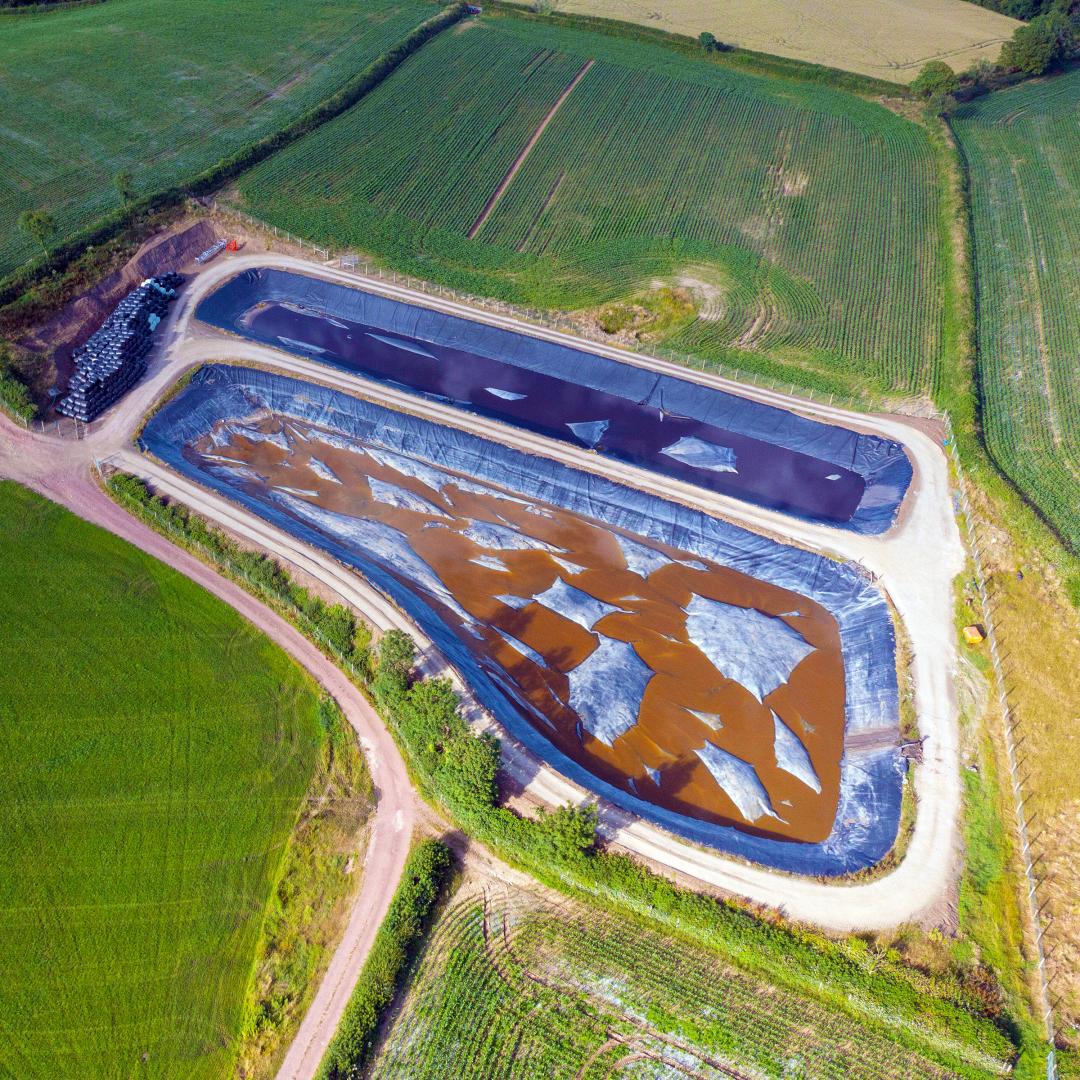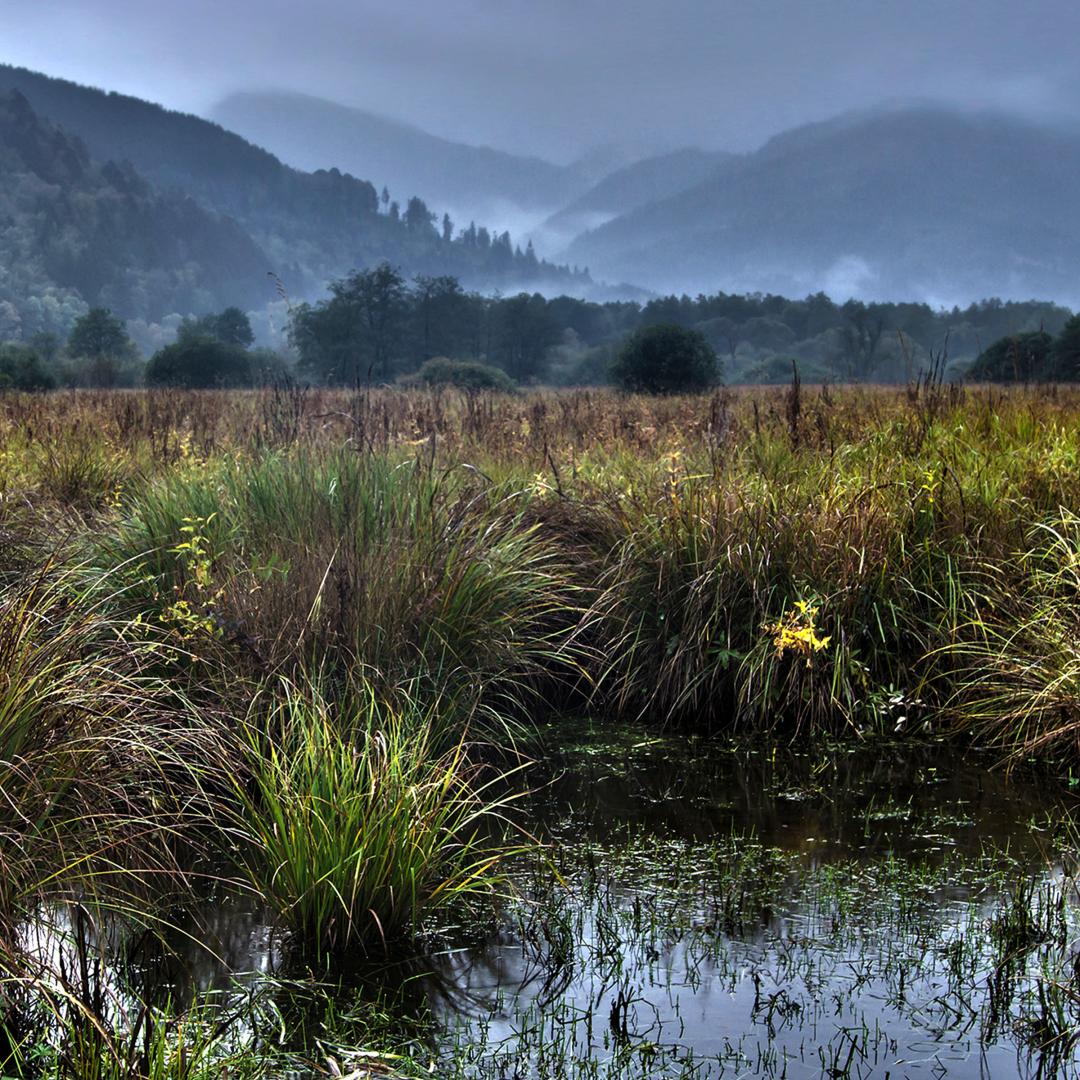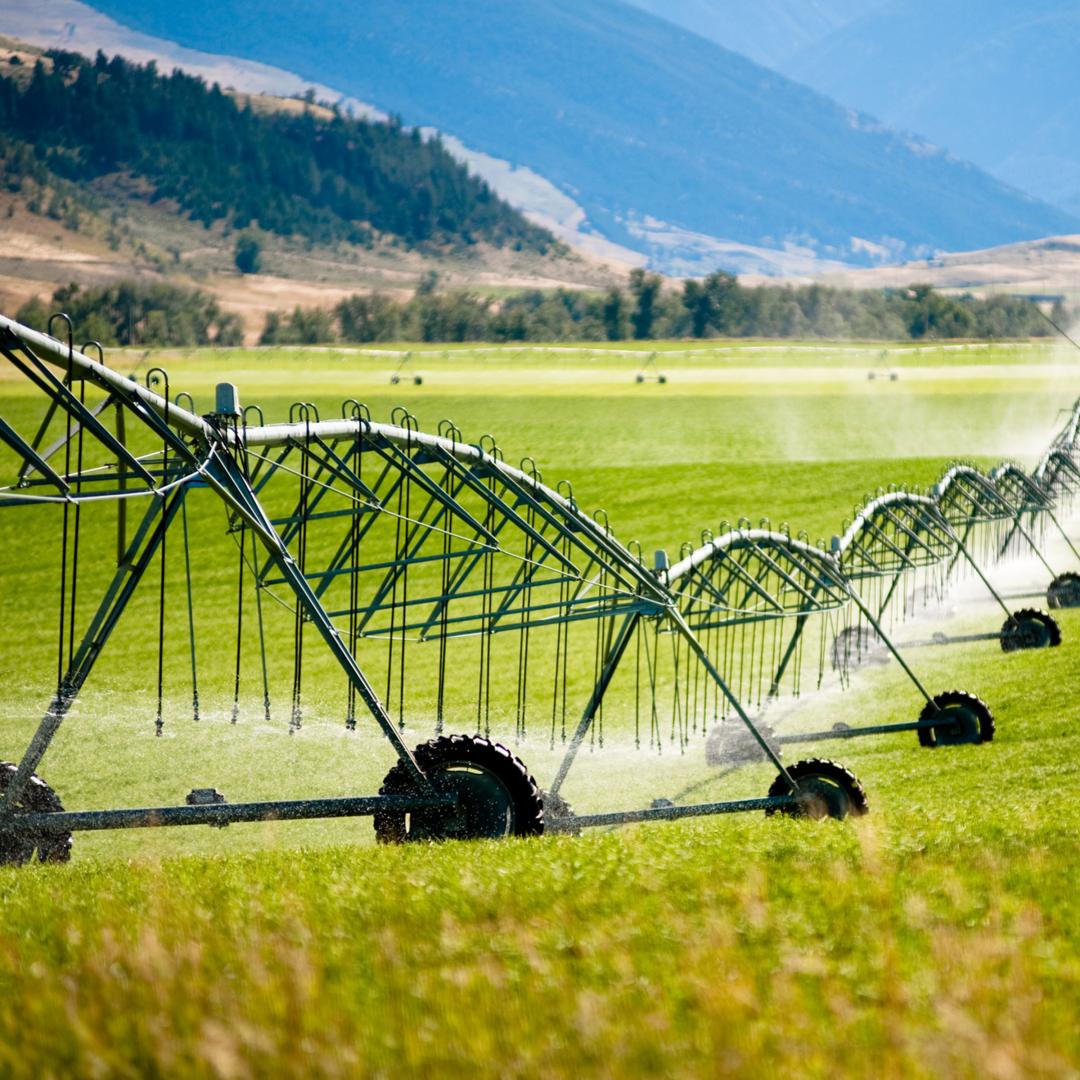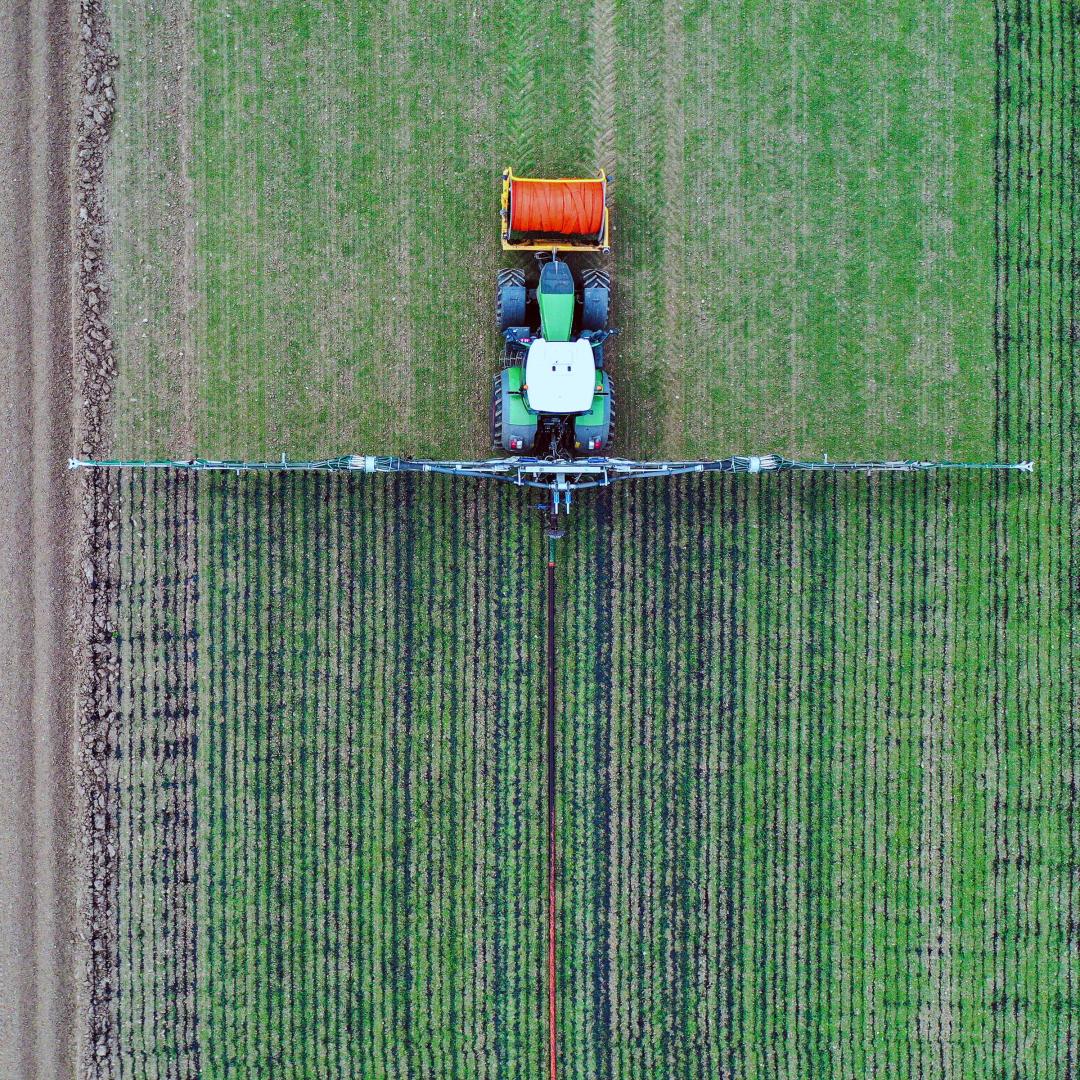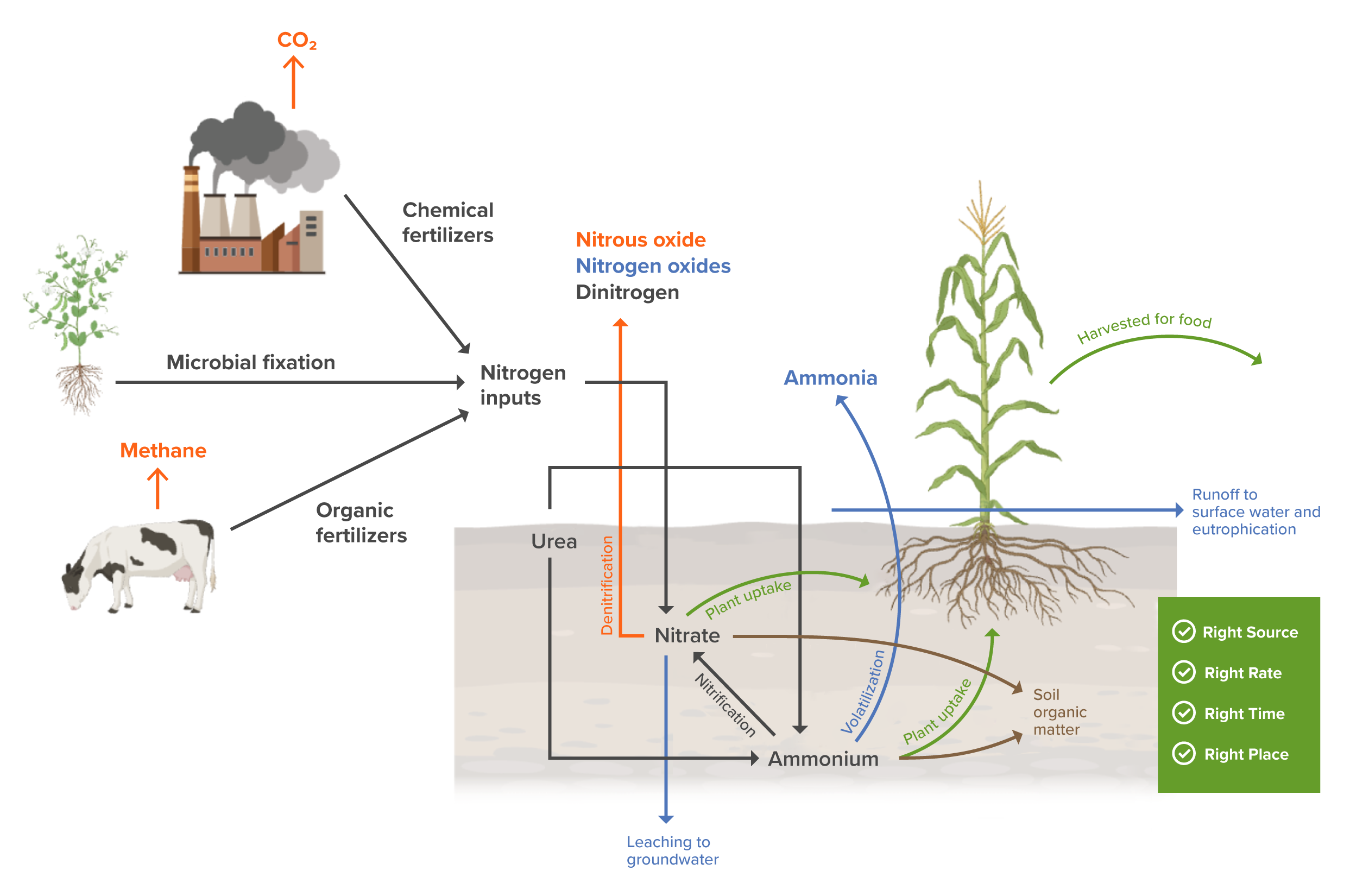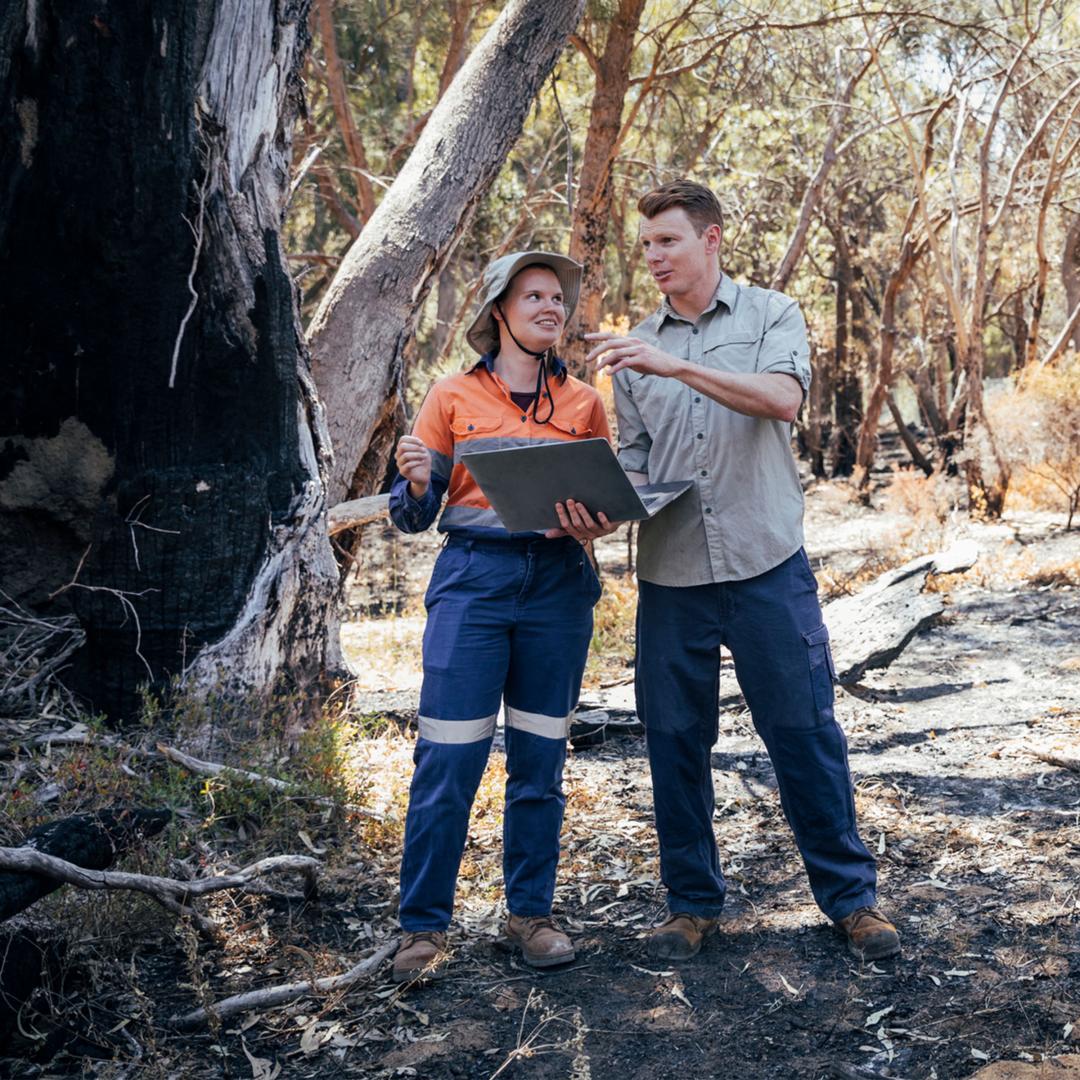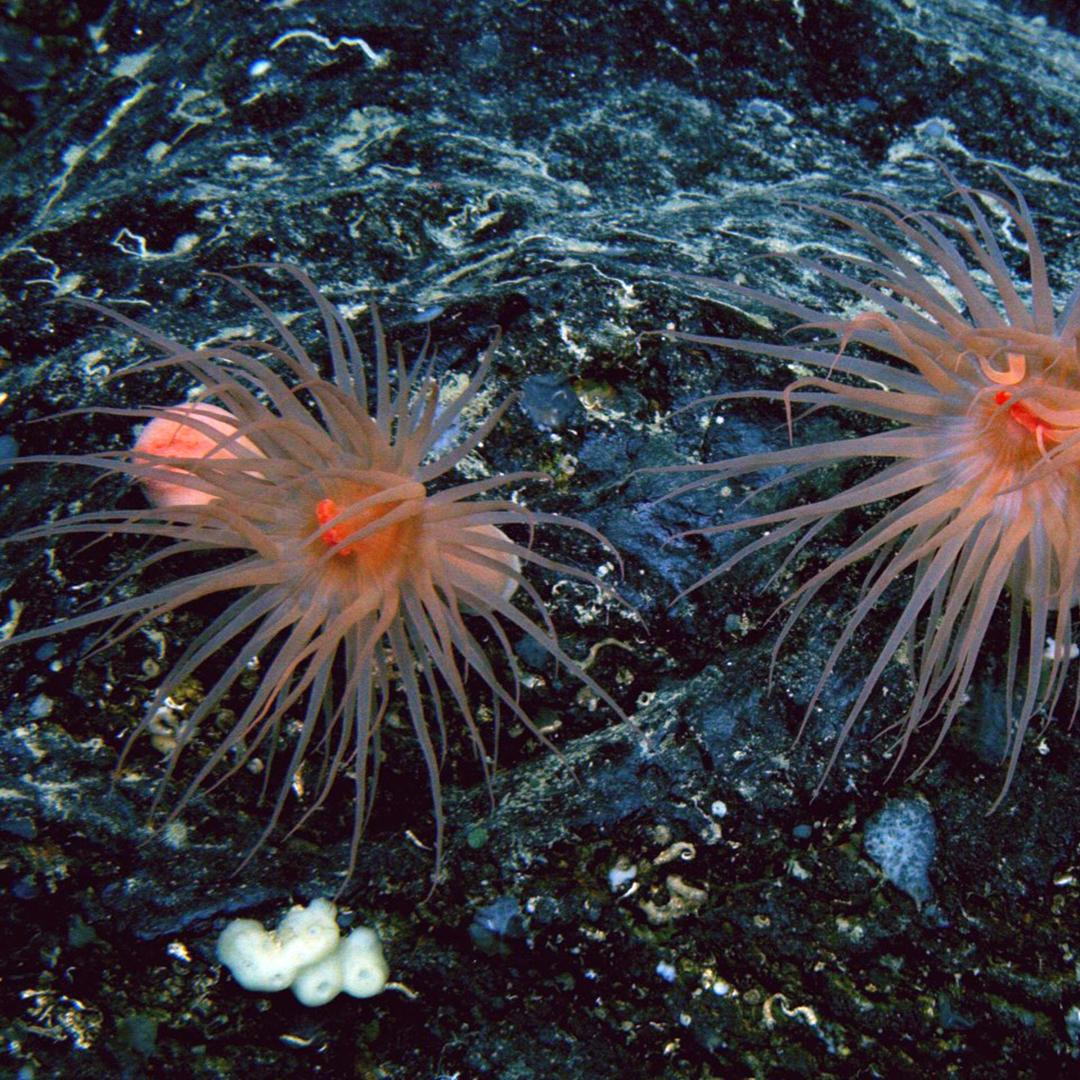Adams, C., Rodrigues, S. T., Calmon, M., & Kumar, C. (2016). Impacts of large-scale forest restoration on socioeconomic status and local livelihoods: What we know and do not know. Biotropica, 48(6), 731–744. Link to source: https://doi.org/10.1111/btp.12385
Ager, A. A., Vogler, K. C., Day, M. A., & Bailey, J. D. (2017). Economic opportunities and trade-offs in collaborative forest landscape restoration. Ecological Economics, 136, 226–239. Link to source: https://doi.org/10.1016/j.ecolecon.2017.01.001
Andres, S. E., Standish, R. J., Lieurance, P. E., Mills, C. H., Harper, R. J., Butler, D. W., Adams, V. M., Lehmann, C., Tetu, S. G., Cuneo, P., Offord, C. A., & Gallagher, R. V. (2023). Defining biodiverse reforestation: Why it matters for climate change mitigation and biodiversity. Plants, People, Planet, 5(1), 27–38. Link to source: https://doi.org/10.1002/ppp3.10329
Austin, K. G., Baker, J. S., Sohngen, B. L., Wade, C. M., Daigneault, A., Ohrel, S. B., Ragnauth, S., & Bean, A. (2020). The economic costs of planting, preserving, and managing the world’s forests to mitigate climate change. Nature Communications, 11(1), Article 5946. Link to source: https://doi.org/10.1038/s41467-020-19578-z
Bastin, J.-F., Finegold, Y., Garcia, C., Mollicone, D., Rezende, M., Routh, D., Zohner, C. M., & Crowther, T. W. (2019). The global tree restoration potential. Science, 365(6448), 76–79. Link to source: https://doi.org/10.1126/science.aax0848
Begliomini, F. N., & Brancalion, P. H. S. (2024). Are state-of-the-art LULC maps able to track ecological restoration efforts in Brazilian Atlantic forest? IGARSS 2024 - 2024 IEEE International Geoscience and Remote Sensing Symposium, 4748–4752. Link to source: https://doi.org/10.1109/IGARSS53475.2024.10641177
Beltrão, M. G., Gonçalves, C. F., Brancalion, P. H. S., Carmignotto, A. P., Silveira, L. F., Galetti, P. M., & Galetti, M. (2024). Priority areas and implementation of ecological corridor through forest restoration to safeguard biodiversity. Scientific Reports, 14(1), Article 30837. Link to source: https://doi.org/10.1038/s41598-024-81483-y
Bernal, B., Murray, L. T., & Pearson, T. R. H. (2018). Global carbon dioxide removal rates from forest landscape restoration activities. Carbon Balance and Management, 13(1), Article 22. Link to source: https://doi.org/10.1186/s13021-018-0110-8
Betts, R. A. (2000). Offset of the potential carbon sink from boreal forestation by decreases in surface albedo. Nature, 408(6809), 187–190. Link to source: https://doi.org/10.1038/35041545
Bialic-Murphy, L., McElderry, R. M., Esquivel-Muelbert, A., van den Hoogen, J., Zuidema, P. A., Phillips, O. L., de Oliveira, E. A., Loayza, P. A., Alvarez-Davila, E., Alves, L. F., Maia, V. A., Vieira, S. A., Arantes da Silva, L. C., Araujo-Murakami, A., Arets, E., Astigarraga, J., Baccaro, F., Baker, T., Banki, O., … Crowther, T. W. (2024). The pace of life for forest trees. Science, 386(6717), 92–98. Link to source: https://doi.org/10.1126/science.adk9616
Bliege Bird, R., & Nimmo, D. (2018). Restore the lost ecological functions of people. Nature Ecology & Evolution, 2(7), 1050–1052. Link to source: https://doi.org/10.1038/s41559-018-0576-5
Brancalion, P. H. S., de Siqueira, L. P., Amazonas, N. T., Rizek, M. B., Mendes, A. F., Santiami, E. L., Rodrigues, R. R., Calmon, M., Benini, R., Tymus, J. R. C., Holl, K. D., & Chaves, R. B. (2022). Ecosystem restoration job creation potential in Brazil. People and Nature, 4(6), 1426–1434. Link to source: https://doi.org/10.1002/pan3.10370
Brancalion, P. H. S., Hua, F., Joyce, F. H., Antonelli, A., & Holl, K. D. (2025). Moving biodiversity from an afterthought to a key outcome of forest restoration. Nature Reviews Biodiversity, 1(4), 248–261. https://doi.org/10.1038/s44358-025-00032-1
Brumberg, H., Margaret Hegwood, Eichhorst, W., LoPresti, A., Erbaugh, J. T., & Kroeger, T. (2025). Global analysis of constraints to natural climate solution implementation. PNAS Nexus, 4(6), Article pgaf173. Link to source: https://doi.org/10.1093/pnasnexus/pgaf173
Bukoski, J. J., Cook-Patton, S. C., Melikov, C., Ban, H., Chen, J. L., Goldman, E. D., Harris, N. L., & Potts, M. D. (2022). Rates and drivers of aboveground carbon accumulation in global monoculture plantation forests. Nature Communications, 13(1), Article 4206. Link to source: https://doi.org/10.1038/s41467-022-31380-7
Busch, J., Bukoski, J. J., Cook-Patton, S. C., Griscom, B., Kaczan, D., Potts, M. D., Yi, Y., & Vincent, J. R. (2024). Cost-effectiveness of natural forest regeneration and plantations for climate mitigation. Nature Climate Change, 14(9), 996–1002. Link to source: https://doi.org/10.1038/s41558-024-02068-1
Chaplin-Kramer, R., Ramler, I., Sharp, R., Haddad, N. M., Gerber, J. S., West, P. C., Mandle, L., Engstrom, P., Baccini, A., Sim, S., Mueller, C., & King, H. (2015). Degradation in carbon stocks near tropical forest edges. Nature Communications, 6(1), Article 10158. Link to source: https://doi.org/10.1038/ncomms10158
Chazdon, R. L., Falk, D. A., Banin, L. F., Wagner, M., J. Wilson, S., Grabowski, R. C., & Suding, K. N. (2024). The intervention continuum in restoration ecology: Rethinking the active–passive dichotomy. Restoration Ecology, 32(8), Article e13535. Link to source: https://doi.org/10.1111/rec.13535
Chazdon, R. L., & Guariguata, M. R. (2016). Natural regeneration as a tool for large-scale forest restoration in the tropics: Prospects and challenges. Biotropica, 48(6), 716–730. Link to source: https://doi.org/10.1111/btp.12381
Chazdon, R. L., Wilson, S. J., Brondizio, E., Guariguata, M. R., & Herbohn, J. (2021). Key challenges for governing forest and landscape restoration across different contexts. Land Use Policy, 104, Article 104854. Link to source: https://doi.org/10.1016/j.landusepol.2020.104854
Cook-Patton, S. C., Leavitt, S. M., Gibbs, D., Harris, N. L., Lister, K., Anderson-Teixeira, K. J., Briggs, R. D., Chazdon, R. L., Crowther, T. W., Ellis, P. W., Griscom, H. P., Herrmann, V., Holl, K. D., Houghton, R. A., Larrosa, C., Lomax, G., Lucas, R., Madsen, P., Malhi, Y., … Griscom, B. W. (2020). Mapping carbon accumulation potential from global natural forest regrowth. Nature, 585(7826), 545–550. Link to source: https://doi.org/10.1038/s41586-020-2686-x
Crouzeilles, R., Barros, F. S. M., Molin, P. G., Ferreira, M. S., Junqueira, A. B., Chazdon, R. L., Lindenmayer, D. B., Tymus, J. R. C., Strassburg, B. B. N., & Brancalion, P. H. S. (2019). A new approach to map landscape variation in forest restoration success in tropical and temperate forest biomes. Journal of Applied Ecology, 56(12), 2675–2686. Link to source: https://doi.org/10.1111/1365-2664.13501
Crouzeilles, R., Curran, M., Ferreira, M. S., Lindenmayer, D. B., Grelle, C. E. V., & Rey Benayas, J. M. (2016). A global meta-analysis on the ecological drivers of forest restoration success. Nature Communications, 7(1), Article 11666. Link to source: https://doi.org/10.1038/ncomms11666
Curtis, P. G., Slay, C. M., Harris, N. L., Tyukavina, A., & Hansen, M. C. (2018). Classifying drivers of global forest loss. Science, 361(6407), 1108–1111. Link to source: https://doi.org/10.1126/science.aau3445
Dhakal, S., J.C. Minx, F.L. Toth, A. Abdel-Aziz, M.J. Figueroa Meza, K. Hubacek, I.G.C. Jonckheere, Yong-Gun Kim, G.F. Nemet, S. Pachauri, X.C. Tan, T. Wiedmann, 2022: Emissions Trends and Drivers. In IPCC, 2022: Climate Change 2022: Mitigation of Climate Change. Contribution of Working Group III to the Sixth Assessment Report of the Intergovernmental Panel on Climate Change [P.R. Shukla, J. Skea, R. Slade, A. Al Khourdajie, R. van Diemen, D. McCollum, M. Pathak, S. Some, P. Vyas, R. Fradera, M. Belkacemi, A. Hasija, G. Lisboa, S. Luz, J. Malley, (eds.)]. Cambridge University Press, Cambridge, UK and New York, NY, USA. Link to source: https://doi.org/10.1017/9781009157926.004
De Groot, R. S., Blignaut, J., Van Der Ploeg, S., Aronson, J., Elmqvist, T., & Farley, J. (2013). Benefits of investing in ecosystem restoration. Conservation Biology, 27(6), 1286–1293. Link to source: https://doi.org/10.1111/cobi.12158
de Souza, S. E. X. F., Vidal, E., Chagas, G. de F., Elgar, A. T., & Brancalion, P. H. S. (2016). Ecological outcomes and livelihood benefits of community-managed agroforests and second growth forests in Southeast Brazil. Biotropica, 48(6), 868–881. Link to source: https://doi.org/10.1111/btp.12388
Di Sacco, A., Hardwick, K. A., Blakesley, D., Brancalion, P. H. S., Breman, E., Cecilio Rebola, L., Chomba, S., Dixon, K., Elliott, S., Ruyonga, G., Shaw, K., Smith, P., Smith, R. J., & Antonelli, A. (2021). Ten golden rules for reforestation to optimize carbon sequestration, biodiversity recovery and livelihood benefits. Global Change Biology, 27(7), 1328–1348. Link to source: https://doi.org/10.1111/gcb.15498
Dib, V., Brancalion, P. H. S., Chan Chou, S., Cooper, M., Ellison, D., Farjalla, V. F., Filoso, S., Meli, P., Pires, A. P. F., Rodriguez, D. A., Iribarrem, A., Latawiec, A. E., Scarano, F. R., Vogl, A. L., de Viveiros Grelle, C. E., & Strassburg, B. (2023). Shedding light on the complex relationship between forest restoration and water services. Restoration Ecology, 31(5), Article e13890. Link to source: https://doi.org/10.1111/rec.13890
dos Reis Oliveira, P. C., Gualda, G. A. F., Rossi, G. F., Camargo, A. F. M., Filoso, S., Brancalion, P. H., & Ferraz, S. F. de B. (2025). Forest restoration improves habitat and water quality in tropical streams: A multiscale landscape assessment. Science of The Total Environment, 963, Article 178256. Link to source: https://doi.org/10.1016/j.scitotenv.2024.178256
Fargione, J., Haase, D. L., Burney, O. T., Kildisheva, O. A., Edge, G., Cook-Patton, S. C., Chapman, T., Rempel, A., Hurteau, M. D., Davis, K. T., Dobrowski, S., Enebak, S., De La Torre, R., Bhuta, A. A. R., Cubbage, F., Kittler, B., Zhang, D., & Guldin, R. W. (2021). Challenges to the reforestation pipeline in the United States. Frontiers in Forests and Global Change, 4, Article 629198. https://doi.org/10.3389/ffgc.2021.629198
Fesenmyer, K. A., Poor, E. E., Terasaki Hart, D. E., Veldman, J. W., Fleischman, F., Choksi, P., Archibald, S., Armani, M., Fagan, M. E., Fricke, E. C., Terrer, C., Hasler, N., Williams, C. A., Ellis, P. W., & Cook-Patton, S. C. (2025). Addressing critiques refines global estimates of reforestation potential for climate change mitigation. Nature Communications, 16(1), Article 4572. Link to source: https://doi.org/10.1038/s41467-025-59799-8
Fletcher, M.-S., Hamilton, R., Dressler, W., & Palmer, L. (2021). Indigenous knowledge and the shackles of wilderness. Proceedings of the National Academy of Sciences, 118(40), Article e2022218118. Link to source: https://doi.org/10.1073/pnas.2022218118
Friedlingstein, P., O’Sullivan, M., Jones, M. W., Andrew, R. M., Bakker, D. C. E., Hauck, J., Landschützer, P., Le Quéré, C., Luijkx, I. T., Peters, G. P., Peters, W., Pongratz, J., Schwingshackl, C., Sitch, S., Canadell, J. G., Ciais, P., Jackson, R. B., Alin, S. R., Anthoni, P., … Zheng, B. (2023). Global carbon budget 2023. Earth System Science Data, 15(12), 5301–5369. Link to source: https://doi.org/10.5194/essd-15-5301-2023
Gann, G. D., Walder, B., Gladstone, J., Manirajah, S. M., & Roe, S. (2022). Restoration project information sharing framework. Climate Focus and The Society for Ecological Restoration. Link to source: https://globalrestorationobservatory.com/restoration-project-information-sharing-framework/
Gardon, F. R., Toledo, R. M. de, Brentan, B. M., & Santos, R. F. dos. (2020). Rainfall interception and plant community in young forest restorations. Ecological Indicators, 109, Article 105779. Link to source: https://doi.org/10.1016/j.ecolind.2019.105779
Garnett, S. T., Burgess, N. D., Fa, J. E., Fernández-Llamazares, Á., Molnár, Z., Robinson, C. J., Watson, J. E. M., Zander, K. K., Austin, B., Brondizio, E. S., Collier, N. F., Duncan, T., Ellis, E., Geyle, H., Jackson, M. V., Jonas, H., Malmer, P., McGowan, B., Sivongxay, A., & Leiper, I. (2018). A spatial overview of the global importance of Indigenous lands for conservation. Nature Sustainability, 1(7), 369–374. Link to source: https://doi.org/10.1038/s41893-018-0100-6
Gibbs, D. A., Rose, M., Grassi, G., Melo, J., Rossi, S., Heinrich, V., & Harris, N. L. (2024). Revised and updated geospatial monitoring of twenty-first century forest carbon fluxes. Earth System Science Data Discussions, 17(3), 1217-1243. Link to source: https://doi.org/10.5194/essd-2024-397
Griscom, B. W., Adams, J., Ellis, P. W., Houghton, R. A., Lomax, G., Miteva, D. A., Schlesinger, W. H., Shoch, D., Siikamäki, J. V., Smith, P., Woodbury, P., Zganjar, C., Blackman, A., Campari, J., Conant, R. T., Delgado, C., Elias, P., Gopalakrishna, T., Hamsik, M. R., … Fargione, J. (2017). Natural climate solutions. Proceedings of the National Academy of Sciences, 114(44), 11645–11650. Link to source: https://doi.org/10.1073/pnas.1710465114
Hansen, M. C., Potapov, P. V., Moore, R., Hancher, M., Turubanova, S. A., Tyukavina, A., Thau, D., Stehman, S. V., Goetz, S. J., Loveland, T. R., Kommareddy, A., Egorov, A., Chini, L., Justice, C. O., & Townshend, J. R. G. (2013). High-resolution global maps of 21st-century forest cover change. Science, 342(6160), 850–853. Link to source: https://doi.org/10.1126/science.1244693
Harris, N. L., Gibbs, D. A., Baccini, A., Birdsey, R. A., de Bruin, S., Farina, M., Fatoyinbo, L., Hansen, M. C., Herold, M., Houghton, R. A., Potapov, P. V., Suarez, D. R., Roman-Cuesta, R. M., Saatchi, S. S., Slay, C. M., Turubanova, S. A., & Tyukavina, A. (2021). Global maps of twenty-first century forest carbon fluxes. Nature Climate Change, 11(3), 234–240. Link to source: https://doi.org/10.1038/s41558-020-00976-6
Hasler, N., Williams, C. A., Denney, V. C., Ellis, P. W., Shrestha, S., Terasaki Hart, D. E., Wolff, N. H., Yeo, S., Crowther, T. W., Werden, L. K., & Cook-Patton, S. C. (2024). Accounting for albedo change to identify climate-positive tree cover restoration. Nature Communications, 15(1), Article 2275. Link to source: https://doi.org/10.1038/s41467-024-46577-1
Herrera, D., Ellis, A., Fisher, B., Golden, C. D., Johnson, K., Mulligan, M., Pfaff, A., Treuer, T., & Ricketts, T. H. (2017). Upstream watershed condition predicts rural children’s health across 35 developing countries. Nature Communications, 8(1), Article 811. Link to source: https://doi.org/10.1038/s41467-017-00775-2
Hua, F., Bruijnzeel, L. A., Meli, P., Martin, P. A., Zhang, J., Nakagawa, S., Miao, X., Wang, W., McEvoy, C., Peña-Arancibia, J. L., Brancalion, P. H. S., Smith, P., Edwards, D. P., & Balmford, A. (2022). The biodiversity and ecosystem service contributions and trade-offs of forest restoration approaches. Science, 376(6595), 839–844. Link to source: https://doi.org/10.1126/science.abl4649
Kabeja, C., Li, R., Guo, J., Rwatangabo, D. E. R., Manyifika, M., Gao, Z., Wang, Y., & Zhang, Y. (2020). The impact of reforestation induced land cover change (1990–2017) on flood peak discharge using HEC-HMS hydrological model and satellite observations: A study in two mountain basins, China. Water, 12(5), Article 1347. Link to source: https://doi.org/10.3390/w12051347
Keesing, F., & Ostfeld, R. S. (2021). Impacts of biodiversity and biodiversity loss on zoonotic diseases. Proceedings of the National Academy of Sciences, 118(17), Article e2023540118. Link to source: https://doi.org/10.1073/pnas.2023540118
Kroeger, T., Erbaugh, J., Luo, Z., Brumberg, H., Eichhorst, W., Hegwood, M., LoPresti, A., Shyamsundar, P., Ellis, P., Oakes, L., Martin, D., Brancalion, P., Bourne, M., Jagadish, A., Austin, K., Kinzer, A., Sanjuán, M., McCullough, L., & Echavarria, M. (2025). Implementation constraints on natural climate solutions: A global literature review and survey. Research Square. Link to source: https://doi.org/10.21203/rs.3.rs-6890465/v1
Kübler, D., & Günter, S. (2024). Forest restoration for climate change mitigation and adaptation. In P. Katila, C. J. Pierce Colfer, W. de Jong, G. Galloway, P. Pacheco, & G. Winkel (Eds.), Restoring Forests and Trees for Sustainable Development: Policies, Practices, Impacts, and Ways Forward (p. 135-159). Oxford University Press. Link to source: https://doi.org/10.1093/9780197683958.003.0006
Kumar, C., Calmon, M., & Saint-Laurent, C. (Eds.) (with Begeladze, S.). (2015). Enhancing food security through forest landscape restoration: Lessons from Burkina Faso, Brazil, Guatemala, Viet Nam, Ghana, Ethiopia and Philippines. IUCN International Union for Conservation of Nature. Link to source: https://doi.org/10.2305/IUCN.CH.2015.FR.2.en
Lawrence, D., Coe, M., Walker, W., Verchot, L., & Vandecar, K. (2022). The unseen effects of deforestation: Biophysical effects on climate. Frontiers in Forests and Global Change, 5, Article 756115. Link to source: https://doi.org/10.3389/ffgc.2022.756115
Löfqvist, S., Kleinschroth, F., Bey, A., de Bremond, A., DeFries, R., Dong, J., Fleischman, F., Lele, S., Martin, D. A., Messerli, P., Meyfroidt, P., Pfeifer, M., Rakotonarivo, S. O., Ramankutty, N., Ramprasad, V., Rana, P., Rhemtulla, J. M., Ryan, C. M., Vieira, I. C. G., … Garrett, R. D. (2023). How social considerations improve the equity and effectiveness of ecosystem restoration. BioScience, 73(2), 134–148. Link to source: https://doi.org/10.1093/biosci/biac099
Mariappan, M., & Zumbado, A. R. (2024). Global Restoration Commitments and Pledges: 2024 Report. International Union for the Conservation of Nature.
Melo, F. P. L., Parry, L., Brancalion, P. H. S., Pinto, S. R. R., Freitas, J., Manhães, A. P., Meli, P., Ganade, G., & Chazdon, R. L. (2021). Adding forests to the water–energy–food nexus. Nature Sustainability, 4(2), 85–92. Link to source: https://doi.org/10.1038/s41893-020-00608-z
Nabuurs, G.-J., Mrabet, R., Hatab, A. A., Bustamante, M., Clark, H., Havlík, P., House, J. I., Mbow, C., Ninan, K. N., Popp, A., Roe, S., Sohngen, B., & Towprayoon, S. (2022). Agriculture, forestry and other land uses (AFOLU). In P. R. Shukla, J. Skea, R. Slade, A. Al Khourdajie, R. van Diemen, D. McCollum, M. Pathak, S. Some, P. Vyas, R. Fradera, M. Belkacemi, A. Hasija, G. Lisboa, S. Luz, & J. Malley (Eds.), Climate change 2022: Mitigation of climate change. Contribution of working group III to the sixth assessment report of the intergovernmental panel on climate change (pp. 747–860). Cambridge University Press. Link to source: https://doi.org/10.1017/9781009157926.009
Naidoo, R., Gerkey, D., Hole, D., Pfaff, A., Ellis, A. M., Golden, C. D., Herrera, D., Johnson, K., Mulligan, M., Ricketts, T. H., & Fisher, B. (2019). Evaluating the impacts of protected areas on human well-being across the developing world. Science Advances, 5(4), Article eaav3006. Link to source: https://doi.org/10.1126/sciadv.aav3006
North, M. P., Stevens, J. T., Greene, D. F., Coppoletta, M., Knapp, E. E., Latimer, A. M., Restaino, C. M., Tompkins, R. E., Welch, K. R., York, R. A., Young, D. J. N., Axelson, J. N., Buckley, T. N., Estes, B. L., Hager, R. N., Long, J. W., Meyer, M. D., Ostoja, S. M., Safford, H. D., … Wyrsch, P. (2019). Tamm review: Reforestation for resilience in dry western U.S. forests. Forest Ecology and Management, 432, 209–224. Link to source: https://doi.org/10.1016/j.foreco.2018.09.007
Pan, Y., Birdsey, R. A., Phillips, O. L., Houghton, R. A., Fang, J., Kauppi, P. E., Keith, H., Kurz, W. A., Ito, A., Lewis, S. L., Nabuurs, G.-J., Shvidenko, A., Hashimoto, S., Lerink, B., Schepaschenko, D., Castanho, A., & Murdiyarso, D. (2024). The enduring world forest carbon sink. Nature, 631(8021), 563–569. Link to source: https://doi.org/10.1038/s41586-024-07602-x
Piffer, P. R., Rosa, M. R., Tambosi, L. R., Metzger, J. P., & Uriarte, M. (2022). Turnover rates of regenerated forests challenge restoration efforts in the Brazilian Atlantic forest. Environmental Research Letters, 17(4), Article 045009. Link to source: https://doi.org/10.1088/1748-9326/ac5ae1
Poorter, L., van der Sande, M. T., Thompson, J., Arets, E. J. M. M., Alarcón, A., Álvarez-Sánchez, J., Ascarrunz, N., Balvanera, P., Barajas-Guzmán, G., Boit, A., Bongers, F., Carvalho, F. A., Casanoves, F., Cornejo-Tenorio, G., Costa, F. R. C., de Castilho, C. V., Duivenvoorden, J. F., Dutrieux, L. P., Enquist, B. J., … Peña-Claros, M. (2015). Diversity enhances carbon storage in tropical forests. Global Ecology and Biogeography, 24(11), 1314–1328. Link to source: https://doi.org/10.1111/geb.12364
Reddington, C. L., Butt, E. W., Ridley, D. A., Artaxo, P., Morgan, W. T., Coe, H., & Spracklen, D. V. (2015). Air quality and human health improvements from reductions in deforestation-related fire in Brazil. Nature Geoscience, 8(10), 768–771. Link to source: https://doi.org/10.1038/ngeo2535
Reddington, C. L., Smith, C., Butt, E. W., Baker, J. C. A., Oliveira, B. F. A., Yamba, E. I., & Spracklen, D. V. (2025). Tropical deforestation is associated with considerable heat-related mortality. Nature Climate Change, 15(9), 992–999. Link to source: https://doi.org/10.1038/s41558-025-02411-0
Reytar, K., Ferreira-Ferreira, J., Alves, L., Oliveira Cordeiro, C. L. de, & Calmon, M. (2024, December 19). What can tree cover gain data tell us about restoration? Brazil case studies. Global Forest Watch. Link to source: https://www.globalforestwatch.org/blog/forest-insights/tree-cover-gain-restoration-brazil
Robinson, N., Drever, C. R., Gibbs, D. A., Lister, K., Esquivel-Muelbert, A., Heinrich, V., Ciais, P., Silva-Junior, C. H. L., Liu, Z., Pugh, T. A. M., Saatchi, S., Xu, Y., & Cook-Patton, S. C. (2025). Protect young secondary forests for optimum carbon removal. Nature Climate Change, 15, 793–800. Link to source: https://doi.org/10.1038/s41558-025-02355-5
Roe, S., Streck, C., Beach, R., Busch, J., Chapman, M., Daioglou, V., Deppermann, A., Doelman, J., Emmet-Booth, J., Engelmann, J., Fricko, O., Frischmann, C., Funk, J., Grassi, G., Griscom, B., Havlik, P., Hanssen, S., Humpenöder, F., Landholm, D., … Lawrence, D. (2021). Land-based measures to mitigate climate change: Potential and feasibility by country. Global Change Biology, 27(23), 6025–6058. Link to source: https://doi.org/10.1111/gcb.15873
Sankey, T., Belmonte, A., Massey, R., & Leonard, J. (2021). Regional-scale forest restoration effects on ecosystem resiliency to drought: A synthesis of vegetation and moisture trends on Google Earth Engine. Remote Sensing in Ecology and Conservation, 7(2), 259–274. Link to source: https://doi.org/10.1002/rse2.186
Schimetka, L. R., Ruggiero, P. G. C., Carvalho, R. L., Behagel, J., Metzger, J. P., Nascimento, N., Chaves, R. B., Brancalion, P. H. S., Rodrigues, R. R., & Krainovic, P. M. (2024). Costs and benefits of restoration are still poorly quantified: Evidence from a systematic literature review on the Brazilian Atlantic Forest. Restoration Ecology, 32(5), Article e14161. Link to source: https://doi.org/10.1111/rec.14161
Seymour, F., Wolosin, M., & Gray, E. (2022, October 23). Policies underestimate forests’ full effect on the climate. World Resources Institute. Link to source: https://www.wri.org/insights/how-forests-affect-climate
Sims, M. J., Stanimirova, R., Raichuk, A., Neumann, M., Richter, J., Follett, F., MacCarthy, J., Lister, K., Randle, C., Sloat, L., Esipova, E., Jupiter, J., Stanton, C., Morris, D., Melhart Slay, C., Purves, D., & Harris, N. (2025). Global drivers of forest loss at 1 km resolution. Environmental Research Letters, 20(7), Article 074027. Link to source: https://doi.org/10.1088/1748-9326/add606
Stanturf, J. A., Kleine, M., Mansourian, S., Parrotta, J., Madsen, P., Kant, P., Burns, J., & Bolte, A. (2019). Implementing forest landscape restoration under the Bonn Challenge: A systematic approach. Annals of Forest Science, 76(2), 1–21. Link to source: https://doi.org/10.1007/s13595-019-0833-z
Teo, H. C., Raghavan, S. V., He, X., Zeng, Z., Cheng, Y., Luo, X., Lechner, A. M., Ashfold, M. J., Lamba, A., Sreekar, R., Zheng, Q., Chen, A., & Koh, L. P. (2022). Large-scale reforestation can increase water yield and reduce drought risk for water-insecure regions in the Asia-Pacific. Global Change Biology, 28(21), 6385–6403. Link to source: https://doi.org/10.1111/gcb.16404
van der Sande, M. T., Poorter, L., Kooistra, L., Balvanera, P., Thonicke, K., Thompson, J., Arets, E. J. M. M., Garcia Alaniz, N., Jones, L., Mora, F., Mwampamba, T. H., Parr, T., & Peña-Claros, M. (2017). Biodiversity in species, traits, and structure determines carbon stocks and uptake in tropical forests. Biotropica, 49(5), 593–603. Link to source: https://doi.org/10.1111/btp.12453
Veldman, J. W., Overbeck, G. E., Negreiros, D., Mahy, G., Le Stradic, S., Fernandes, G. W., Durigan, G., Buisson, E., Putz, F. E., & Bond, W. J. (2015a). Tyranny of trees in grassy biomes. Science, 347(6221), 484–485. Link to source: https://doi.org/10.1126/science.347.6221.484-c
Veldman, J. W., Overbeck, G. E., Negreiros, D., Mahy, G., Le Stradic, S., Fernandes, G. W., Durigan, G., Buisson, E., Putz, F. E., & Bond, W. J. (2015b). Where Tree Planting and Forest Expansion are Bad for Biodiversity and Ecosystem Services. BioScience, 65(10), 1011–1018. Link to source: https://doi.org/10.1093/biosci/biv118
Verhoeven, D., Berkhout, E., Sewell, A., & van der Esch, S. (2024). The global cost of international commitments on land restoration. Land Degradation & Development, 35(16), 4864–4874. Link to source: https://doi.org/10.1002/ldr.5263
Walker, W. S., Gorelik, S. R., Cook-Patton, S. C., Baccini, A., Farina, M. K., Solvik, K. K., Ellis, P. W., Sanderman, J., Houghton, R. A., Leavitt, S. M., Schwalm, C. R., & Griscom, B. W. (2022). The global potential for increased storage of carbon on land. Proceedings of the National Academy of Sciences, 119(23), Article e2111312119. Link to source: https://doi.org/10.1073/pnas.2111312119
Walton, Z. L., Poudyal, N. C., Hepinstall-Cymerman, J., Johnson Gaither, C., & Boley, B. B. (2016). Exploring the role of forest resources in reducing community vulnerability to the heat effects of climate change. Forest Policy and Economics, 71, 94–102. Link to source: https://doi.org/10.1016/j.forpol.2015.09.001
Wang, Y., Zhu, Y., Cook-Patton, S. C., Sun, W., Zhang, W., Ciais, P., Li, T., Smith, P., Yuan, W., Zhu, X., Canadell, J. G., Deng, X., Xu, Y., Xu, H., Yue, C., & Qin, Z. (2025). Land availability and policy commitments limit global climate mitigation from forestation. Science, 389(6763), 931–934. Link to source: https://doi.org/10.1126/science.adj6841
Williams, B. A., Beyer, H. L., Fagan, M. E., Chazdon, R. L., Schmoeller, M., Sprenkle-Hyppolite, S., Griscom, B. W., Watson, J. E. M., Tedesco, A. M., Gonzalez-Roglich, M., Daldegan, G. A., Bodin, B., Celentano, D., Wilson, S. J., Rhodes, J. R., Alexandre, N. S., Kim, D.-H., Bastos, D., & Crouzeilles, R. (2024). Global potential for natural regeneration in deforested tropical regions. Nature, 636(8041), 131–137. Link to source: https://doi.org/10.1038/s41586-024-08106-4
Zhang, Q., Barnes, M., Benson, M., Burakowski, E., Oishi, A. C., Ouimette, A., Sanders-DeMott, R., Stoy, P. C., Wenzel, M., Xiong, L., Yi, K., & Novick, K. A. (2020). Reforestation and surface cooling in temperate zones: Mechanisms and implications. Global Change Biology, 26(6), 3384–3401. Link to source: https://doi.org/10.1111/gcb.15069

